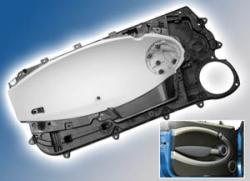plasticker-News
| 2007-04-18 |

|
TechnoCompound: Long fibre PP compound for automobile door trim modules
|
A door trim module in long glass fibre-reinforced polypropylene (PP) for the new MINI was shown by TechnoCompound (www.technocompound.com) at the international VDI conference ‘Plastics in Automotive Engineering’, which took place in Mannheim on 21st and 22nd March 2007. For this application, the German compounding specialist developed a tailor-made compound from its ´TechnoFiber´ range. The new compound is distinguished by its high rigidity and extremely high impact strength. This combination of properties ensures that the door components will not splinter in the event that the vehicle is rammed from the side in a collision and that the entire door meets the legal requirements for passenger safety. Despite its high glass fibre content, the surface quality of the door trim module is so good that the visible surfaces of the map pocket do not have to be painted. TechnoCompound required only 6 months for the development of this customized compound. The door trim module of the MINI is injection moulded in long glass fibrereinforced polypropylene with a 10% w/w glass fibre content. For mass production application, TechnoCompound is currently supplying the processor with a 50% w/w glass fibre concentrate and a pure PP compound. The two raw materials are mixed together to obtain the required glass fibre content prior to the injection moulding process. The door trim module is produced by means of the so-called back injection moulding process, in which a cut-to-shape decorative film is first inserted into the mould cavity prior to the closing of the mould and the injection of the melt. Thus the decorative film is firmly bonded to the moulded part without any need for an additional bonding operation. The injection mould used for this application was manufactured by Georg Kaufmann Formenbau AG, Busslingen (Switzerland). For the future, TechnoCompound is currently developing a compound with a 10% w/w glass fibre content that can be fed directly to the injection moulding machine, thus waiving the need for the processor to mix a concentrate with an unreinforced PP beforehand, the advantage being that glass fibre distribution in the compound is not dependent on the mixing performance of the screw of the injection moulding machine, thus ensuring absolute homogeneity throughout the entire moulded part. This also means that TechnoCompound, as the raw material supplier, remains fully responsible for the material, while the processor not only has a less complicated work process – and hence a much simpler machine configuration – but can also concentrate on his core responsibility as an injection moulder. TechnoCompound´s standard LFT compounds, which are marketed under the name of ´TechnoFiber´, are available with various long-fibre concentrations ranging from 10 to 60% w/w depending on application. The rod-shaped pellets are offered in pellet lengths – and hence fibre lengths – of 10, 15 and 20 mm. Matrix materials include polypropylene (PP), polyamide (PA), polyethylene terephthalate (PET), polybutylene terephthalate (PBT) and polyphenylene sulphide (PPS). Thanks to a special production process, the LFT pellets manifest a very high degree of impregnation, i.e. each individual glass filament is completely enveloped in the polymer matrix. Thus parts produced from these pellets are distinguished by a very high surface quality and can be used where they are fully exposed to view, e.g. in passenger car interiors. Photo: The door trim modules for the new MINI are back injection moulded with a customized polypropylene (PP), reinforced with 10% w/w long glass fibres, from TechnoCompound. Small inset: fully assembled door |
TechnoCompound GmbH, Bad Sobernheim
 back to news list back to news list |  back to top back to top |












